S19-Wk5: Rectifier circuit design
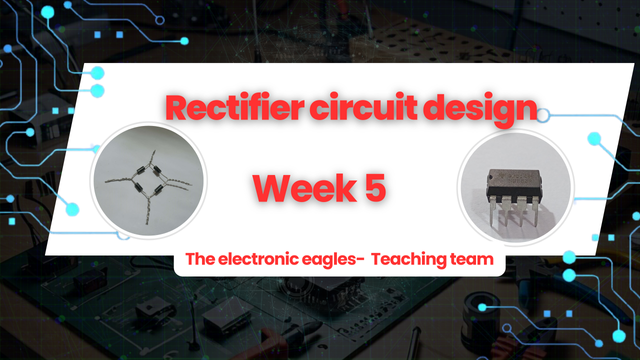
Welcome to the 5th week of our electronics lesson!
If you've been following us up to this point, you should now have a solid understanding of the various components we'll be using by the end of this program, as well as the ability to interpret circuit diagrams.
This week, we're excited to explore rectifier circuits and their applications.
Bridge Rectifier:
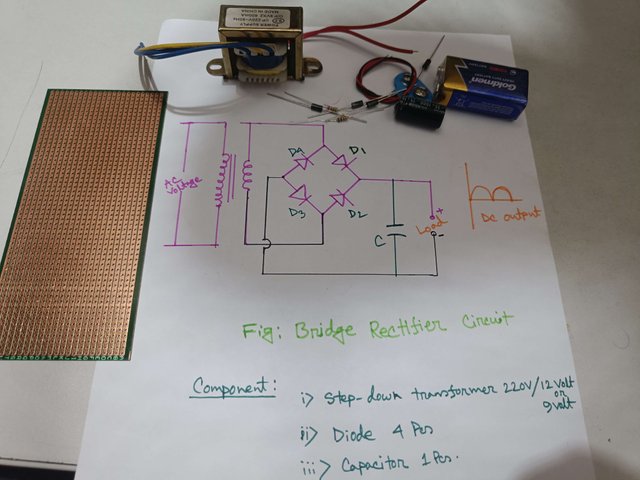
A bridge rectifier is an electronic circuit with four diodes that converts AC power into DC power.
Because four diodes are used, the output polarity does not change regardless of the polarity of the input current.
Working Procedure:
During +ve Half Cycle :
Forward Biased (FB): D1 & D3(On Condition)
Reversed Biased (RB): D2 & D4(Off Condition)
Output DC Voltage: Positive Half Cycle Volt
During -ve Half Cycle:
Forward Biased (FB): D2 & D4(On condition)
Reversed Biased (RB): D1 & D3(Off condition)
Output Voltage: Positive Half Cycle
Capacitor (C): Filter the output DC voltage
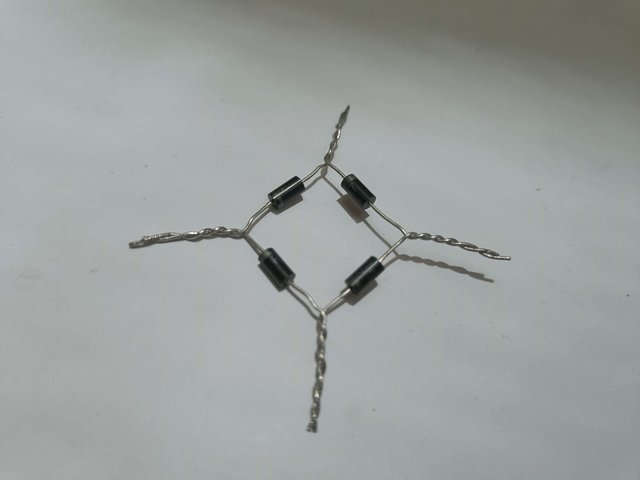
We first connect four rectifier diodes to make a bridge rectifier circuit.
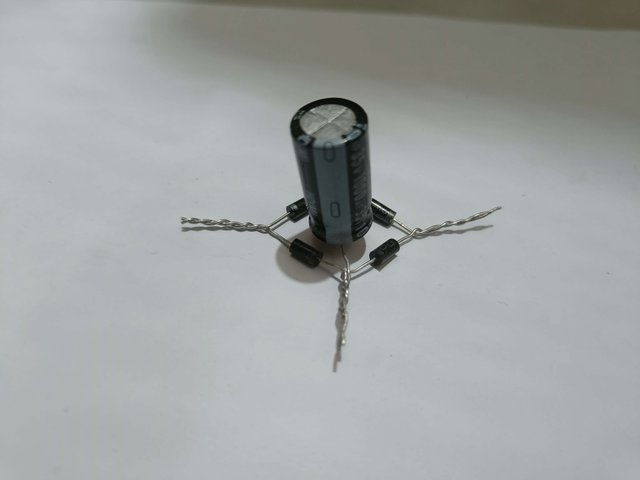
Then we connect a capacitor before the load to filter the output voltage.
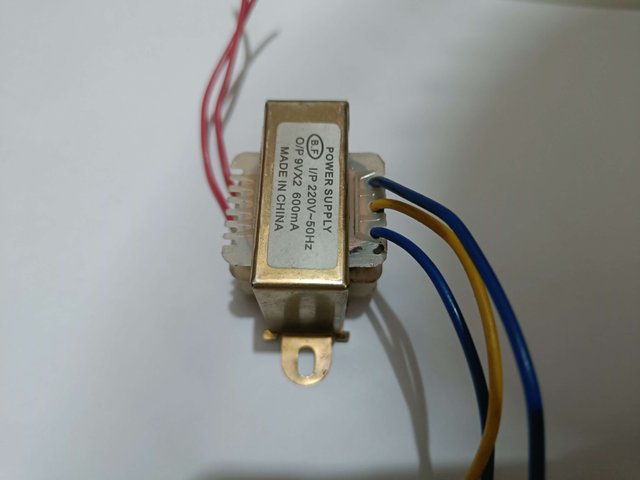
We can give the input voltage in two ways. A step down transformer with 220/9 volt
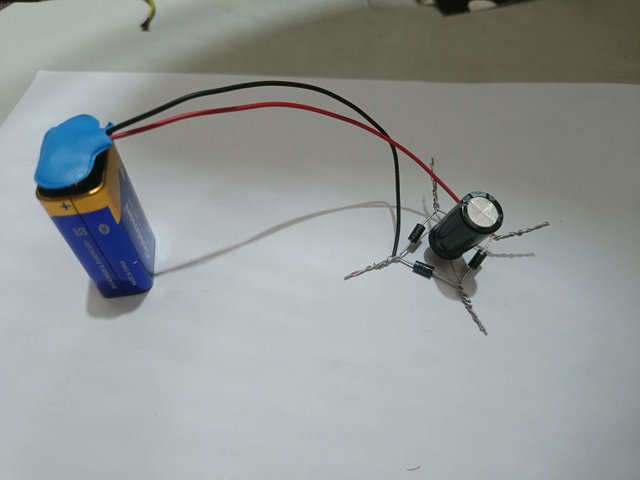
Or 9 volt battery connected to the rectifier diode as shown.
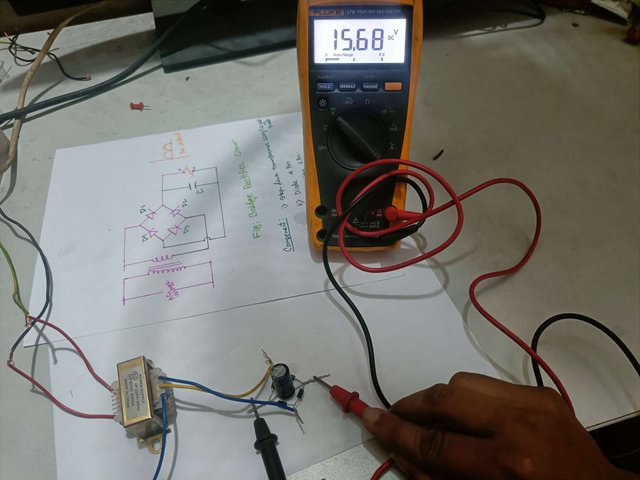
Measure the output voltage of the capacitor by placing a multimeter at the DC point. At the output we get 15.69 DC voltage as shown in the figure.
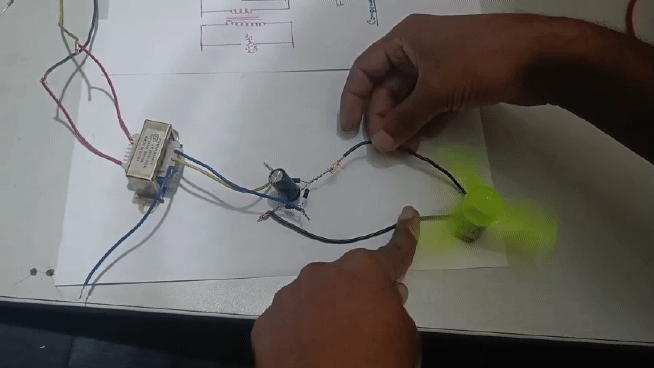
We put a DC fan on the output and load it. The AC input voltage is converted to DC voltage through the rectifier, and the pure DC voltage from the capacitor drives the DC fan.
Uses of Bridge Rectifier:
- Convert AC power to DC power
- DC battery charger (Mobile Charger, Laptop Charger etc)
- Powers DC lights and fans
Note that this can be used to power many other things..., can you think of some...?
Assignment
- Task 1: Build a full wave rectifier circuit like the one we have above, outline the steps you took to build. Measure and indicate the DC output.
- Task 2: Discuss 5 additional applications of the rectifier circuit, apart from the ones we previously mentioned.
- Task 3: What were your observations while building the full wave rectifier circuit, and what precautions did you take?
Instructions :
- Please kindly read all the instructions we have on our post entitled: Reminders For Students in Electronics Academy. We would be working with those instructions STRICTLY

The participation schedule is between Monday, August 5th, at 00:00 UTC to Sunday, - August 11th, 2024 at 23:59 UTC.
DO NOT wait till the last minutes to submit and create unnecessary arguments about time zone, you have the whole week to do your tasks., use it
Feel free to post in any language hence it can be translated on google translator
Please make sure to include our tag #electronicss19w5 among your first four tags for easy search.
You must take clear pictures, you can seek the help of a person to take your pictures, but it is you who must take the measurements.
Post the link of your assignment in the comment section of this lesson.
Avoid unnecessary long and irrelevant introductory
All our instructions are supper important and all participating students are advised to read and understand those rules/regulations.

Note to community curators:
Please NO community curator should use the SC account to vote any assignment in the "Electronic Academy" when such post is not verified yet by any of the professors.
Note to students:
Additional efforts will be taken into account , so try to be creative , original and show your interest in learning .
This lesson is more of practical because we are heading to somewhere. If you have completed all the tasks, please kindly wait for the professor's comments and continue studying to be prepared for the sixth week.
Goodluck
The Electronic Eagles Team
Task 2?
Please make sure you check your posts more carefully before publishing.
Mistakes can undermine the educational credibility of your lessons.
Thanks. Typo fixed.
Esta semana se pone mas interesante ya que trabajaremos con un circuito muy usado, lo único que me preocupa es que debo comprar los componentes vere el presupuesto y decido si participar o no.
Saludos
Hello @arnoldog25, I'm suprised you are talking about supports. The supports you have recieved so far from the Steemit team here in our academy was to assist you in getting few components for all the practicals. I am still trying to figure out why you included that part.
Also, 6 days ago, I made a post telling users who really needed components to contact me.
I think @pennsif also captures that on his Steem news publication and this was further translated to spanish by @inspiracion.
As a matter of fact @lusciouslucy came to my shop to get some components after I made that announcement...., suprised she hasn't made a post about that yet.
@lusciouslucy 6 days ago made a post that confirms this. I was planning to come over for some components, but I concluded that stopping at some electronics shops along Nepa line to get it was a lot closer to me.
At that electronics shop, some simple components cost between 30 to 100 Naira. And as at today, based on coingecko.com One steem is 277.136 Naira and can buy 4 diodes and a capacitor .
Thank you for clarifying the availability of these components in Uyo and giving an idea of their prices.
This information will likely be useful to others who are interested in learning and sourcing these items locally.
You may want to consider sharing your findings in a post on Steem to benefit others .
Hola amigo si es cierto tienes toda la razón gracias a dios y a uds he sido apoyado por estar seleccionado en el top del concurso, posiblemente me explique mel lo que quise decir es que hay post de participación que quedan en cero de no ser por el apoyo de uds los profesores, pero algunos quedan sin apoyo. Se que no todos las publicaciones pueden ser apoyadas pero estas donde hay que invertir pienso que deberían ser tomadas en cuenta, no fué mi intención poner en tela de juicio este maravilloso programa como es la Academia de electrónica ya que durante estas 4 semanas he aprendido más sobre esta materia y de verdad pido disculpas si no fué adecuado mi comentario no quise abrir una polémica.
Saludos
Saludos amigo @arnoldog25, a veces no es necesario comprar los componentes, puedes ubicar placas electrónicas de reciclaje. Ya fuente de poder de pc dañada, un televisor crt dañado, cualquier placa de estas pueden servirte para extraer los 4 diodos que pueden ser 14007 , un capacitor de 1000 UF por 25 o 35 v, y para el transformador, puedes usar uno AC o DC.
El motor, bueno lo puedes ubicar en un dvd viejo o una caseta de disco de computadora viejo. Tienes 7 días para ubicar esos componentes, sea creativo e ingenioso, ya estamos llegando a la última fase.
Además, usted en particular ha recibido apoyo desde el inicio, por lo tanto gracias a las clases de electrónica ha podido recibir recompensas, tanto en la presentación de sus clases y luego en las postulaciones.
El apoyo lo ha tenido siempre.
Hola amigo la verdad no quise hacer una polémica de esto, pero la verdad a pesar de tener un poco conocimiento de electrónica no me habia animado en trabajar esa parte pero una vez que se abrio esta ventana en Steemit de aprender me anime, no tengo tarjetas usadas. Igual trataré de ubicar en los talleres de electrónica para ver si me facilitan algunos componentes y los que no tratar de comprarlos.
En cuanto al apoyo si es cierto por haber sido seleccionado he recibido apoyo pero veo que de 4 publicaciones solo 1 tenia apoyo, tampoco quise hacer una polémica de esto ya que uds los profesores han tratado de apoyarnos en lo posible, posiblemente no me explique bien y si ofendi como le dije al amigo @ubongudofot pido disculpas se que uds estan haciendo un gran trabajo los felicito.
Saludos
https://steemit.com/hive-188837/@lusciouslucy/s19-wk5-rectifier-circuit-design
https://steemit.com/hive-188837/@manuelhooks/s19-wk5-rectifier-circuit-design
Buenas por aca dejo mi participación
https://steemit.com/hive-188837/@arnoldog25/s19-wk5-rectifier-circuit-design
Saludos
https://steemit.com/hive-188837/@udyliciouz/s19-wk5-rectifier-circuit-design
https://steemit.com/hive-188837/@naka05/s19-wk5-diseno-de-circuito-rectificador